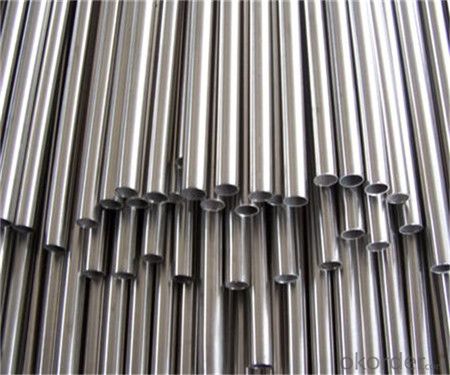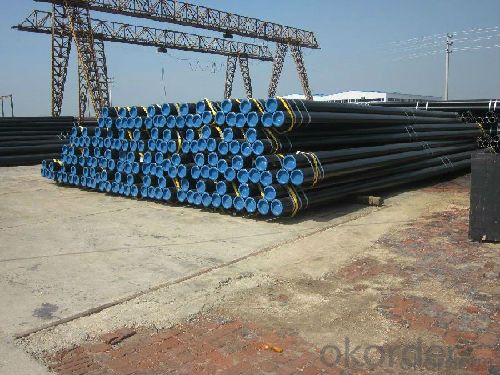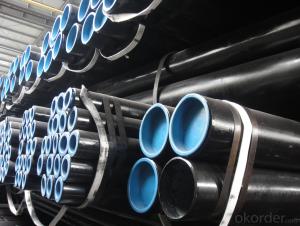Seamless Hot Rolled Steel Pipe >114.3 MM
- Loading Port:
- China Main Port
- Payment Terms:
- TT or LC
- Min Order Qty:
- 100 m.t.
- Supply Capability:
- -
OKorder Service Pledge
OKorder Financial Service
You Might Also Like
1、Structure of Seamless Pipe :
Seamless pipe is produced by drawing a solid billet over a piercing rod to create the hollow shell. As welding is not included in the manufacturing process , seamless pipes are stronger and more reliable.
2、Main Features of the Seamless Pipe :
• High manufacturing accuracy
• High strength
• Small inertia resistance
• Strong heat dissipation ability
• Good visual effect
• Great price
3、Seamless Pipe Specification:
Standard | GB, DIN, ASTM ASTM A106-2006, ASTM A53-2007 |
Grade | 10#-45#, 16Mn 10#, 20#, 45#, 16Mn |
Thickness | 8 - 33 mm |
Section Shape | Round |
Outer Diameter | 133 - 219 mm |
Place of Origin | Shandong, China (Mainland) |
Secondary Or Not | Non-secondary |
Application | Hydraulic Pipe |
Technique | Cold Drawn |
Certification | API |
Surface Treatment | factory state or painted black |
Special Pipe | API Pipe |
Alloy Or Not | Non-alloy |
Length | 5-12M |
Outer Diameter | 21.3-610mm |
Grade | 20#, 45#, Q345, API J55, API K55, API L80, API N80, API P110, A53B |
Standard | ASME, ASTM |
4、Packaging & Delivery
Packaging Details: | seaworthy package,bundles wrapped with strong steel strip |
Delivery Detail: | 15-30days after received 30%TT |
5、FAQ of Seamless Pipe :
①How is the quality of your products?
Guaranteed: If products’ quality don’t accord to discription as we give or the promise before you place order, we promise 100% refund.
②How about price?
We have a policy that “ for saving time and absolutely honest business attitude, we quote as lowest as possible for any customer, and discount can be given according to quantity”.Please trust the quotation we would give you, it is professional one.
③Why should you chose us?
We believe: good quality+good price+good service=customer’s trust
SGS test is available, customer inspection before shipping is welcome, third party inspection is no problem.
6、Seamless Pipe Images:


- Q:How are steel pipes insulated to prevent noise transmission?
- Steel pipes are typically insulated to prevent noise transmission through the use of materials such as mineral wool, fiberglass, or foam. These insulation materials are wrapped around the pipes to create a barrier that absorbs and reduces sound waves, preventing them from traveling and causing noise transmission.
- Q:What are the different strategies for pipe laying using steel pipes?
- There are several strategies for pipe laying using steel pipes, including open cut trenching, trenchless methods such as horizontal directional drilling (HDD), microtunneling, and pipe jacking. In open cut trenching, a trench is dug and the steel pipes are laid in the trench before it is backfilled. HDD involves drilling a small pilot hole underground and then pulling the steel pipes through the hole. Microtunneling uses a remote-controlled boring machine to excavate a tunnel and install the steel pipes simultaneously. Pipe jacking involves pushing the steel pipes into the ground using hydraulic jacks while excavating the soil in front of the pipes. Each strategy has its advantages depending on the specific project requirements and conditions.
- Q:Can steel pipes be used for underground gas distribution?
- Indeed, underground gas distribution can make use of steel pipes. Within the gas industry, steel pipes are widely employed due to their exceptional strength, durability, and resistance to corrosion. These pipes possess the capacity to endure the pressure and stress inherent in gas distribution systems. Moreover, steel pipes have demonstrated their reliability and safety as a means of transporting natural gas below ground. Nevertheless, it is crucial to ensure that these steel pipes are adequately coated and shielded against corrosion in order to preserve their integrity and prolong their lifespan. Consistent inspections and maintenance procedures are also imperative to detect and rectify any potential problems that may arise.
- Q:What is the difference between steel pipes and PEX pipes?
- Steel pipes are made of metal and are known for their durability and strength. They are commonly used in industrial applications and for transporting fluids and gases. On the other hand, PEX pipes are made of a flexible plastic material called cross-linked polyethylene. PEX pipes are more flexible and easier to install compared to steel pipes. They are commonly used in residential plumbing systems due to their resistance to corrosion and ability to expand and contract with temperature changes.
- Q:What is a tight steel tube?
- The fully enclosed steel tube is called "sleeve connection steel pipe". The English abbreviation is JDG. The sleeve between the pipe and the pipe is fastened by screws. The current specification is the construction and acceptance rules of CECS 120:2007 sleeve steel conduit pipe line
- Q:Are steel pipes suitable for high-pressure applications?
- Indeed, steel pipes prove to be an appropriate choice when it comes to high-pressure applications. Renowned for their robustness and endurance, steel pipes are exceptionally well-suited for managing high-pressure scenarios. They possess the remarkable ability to endure the intense internal pressure exerted by fluids or gases without buckling or rupturing. Thanks to their high tensile strength, steel pipes effectively combat the forces that arise in high-pressure environments, thereby ensuring the security and dependability of the piping system. Furthermore, steel pipes can be manufactured with thicker walls, further bolstering their capacity to withstand elevated pressures. Consequently, steel pipes find extensive utilization in various industries, such as oil and gas, petrochemical, power generation, and water distribution, where high-pressure applications are customary.
- Q:Are steel pipes more expensive than other types of pipes?
- The cost of steel pipes compared to other types of pipes can vary depending on various factors. Steel pipes are generally considered to be more expensive than some other types of pipes in terms of upfront cost. This is mainly due to the high cost of raw materials and the manufacturing process involved in producing steel pipes. Additionally, steel pipes are known for their durability and strength, making them a popular choice for applications where high pressure or extreme conditions are involved. However, when considering the long-term cost and benefits, steel pipes can often be more cost-effective. They have a longer lifespan compared to some other types of pipes, reducing the need for frequent repairs or replacements. Steel pipes also offer excellent resistance to corrosion, making them suitable for various environments and reducing maintenance costs over time. Moreover, the strength and durability of steel pipes can contribute to a lower risk of leaks or other failures, which can result in significant cost savings in terms of preventing damage or loss. It is important to consider the specific requirements and characteristics of the project or application when comparing the cost of steel pipes to other types of pipes. Factors such as the type of fluid or material being transported, the required pressure rating, the expected lifespan, and the environmental conditions should all be taken into account. Ultimately, while steel pipes may have a higher upfront cost, their long-term durability and reliability can often make them a cost-effective choice in many applications.
- Q:How are steel pipes protected against corrosion in marine environments?
- Steel pipes are protected against corrosion in marine environments through various methods, including the use of protective coatings, cathodic protection systems, and selecting corrosion-resistant materials.
- Q:Can steel pipes be used for transporting sewage?
- Yes, steel pipes can be used for transporting sewage. Steel pipes are commonly used in sewage systems due to their durability, strength, and corrosion resistance, making them suitable for carrying wastewater and sewage over long distances.
- Q:How to descaling galvanized steel pipe?
- Is red rust or white rust, red rust is the base material rust, white rust is Zinc Coating Rust
1. Manufacturer Overview |
|
|---|---|
| Location | |
| Year Established | |
| Annual Output Value | |
| Main Markets | |
| Company Certifications | |
2. Manufacturer Certificates |
|
|---|---|
| a) Certification Name | |
| Range | |
| Reference | |
| Validity Period | |
3. Manufacturer Capability |
|
|---|---|
| a)Trade Capacity | |
| Nearest Port | |
| Export Percentage | |
| No.of Employees in Trade Department | |
| Language Spoken: | |
| b)Factory Information | |
| Factory Size: | |
| No. of Production Lines | |
| Contract Manufacturing | |
| Product Price Range | |
Send your message to us
Seamless Hot Rolled Steel Pipe >114.3 MM
- Loading Port:
- China Main Port
- Payment Terms:
- TT or LC
- Min Order Qty:
- 100 m.t.
- Supply Capability:
- -
OKorder Service Pledge
OKorder Financial Service
Similar products
New products
Hot products
Related keywords































